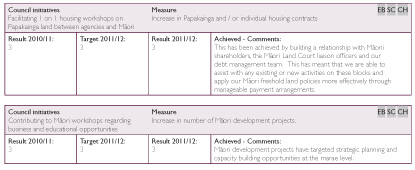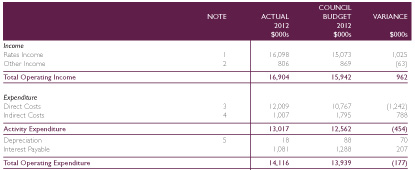At a Glance
Primary Services
- Māori Development
Why We Do It
Council has a number and range of statutory functions that require recognition and respect of the Crown's responsibility to take account of the principles of the Treaty of Waitangi as well as improving opportunities for Māori to participate in Council's decision making processes. The opportunity and ability for Māori to participate enables them to provide for their wellbeing while recognising and providing for the relationship of Māori, their culture and traditions, with their ancestral lands, water, sites wahi tapu and other taonga.As part of their function, the Māori development activity is tasked with facilitating and liaising with Iwi / Hapu to give effect to Council's responsibilities.
What Has Changed Since
The Ltccp 2009/19?
At its October 2009 meeting, Council approved a comprehensive Māori development and engagement action plan subject to the development of appropriate budgets. This builds on key objectives included in the LTCCP. The action plan aims to encourage Māori input to, and participation in, Council decision making processes, as well as improving the ways in which Council works with Māori at a number of different levels. Key actions are reflected in the priorities below.
Priorities For 2011/12 |
What We Have / Haven't Achieved |
|---|---|
| Reflecting Council's commitment to the principles of the Treaty of Waitangi in key documents and publications |
We have included a clear statement of Council's commitment to the principles of the Treaty of Waitangi in key documents and publications. |
| Implementing Māori engagement operating protocols to guide Council's day to day work with Māori on a range of issues |
Developed Māori engagement operating protocols to guide Council's day to day work with Māori on a range of issues and provided staff time to assist on a case by case basis. |
| Developing Memoranda of Understanding (MOU) to underpin Council's relationships with Iwi | We haven't developed a MOU to underpin Council's relationship with Iwi. |
| Building on structural mechanisms to enhance Māori consultation (i.e. Mayor and Iwi Chairs' meetings, Iwi and Council CEO's meetings, and Iwi / Hapu practitioners) | Established a working relationship with Maori through the Mayor and Iwi Leaders forum, Iwi and Council CEO engagements and the Iwi / Hapu practitioners. |
| Ensuring Māori issues are properly understood and addressed in resource consent processes | Provided opportunities for both Council staff and tāngata whenua to workshop issues that are important to Māori through the reviews process of the Iwi / Hapu management plans. |
| Incorporating relevant points from Iwi / Hapu management plans in Council decision making | Incorporated relevant points from Iwi / Hapu management plans into Council's decision making processes. |
| Enhancing Māori representation via 3 ward based Māori representative groups | Agreed in principle for having dedicated Māori seats under a Unitary Authority and resolve to investigate non electoral options for the engagement and involvement of Māori in decision making. |
| Promoting Māori economic development, including pursuing joint projects where opportunities arise | Identified opportunities for joint work on economic development initiatives. |
| Supporting the work of other key bodies, such as Housing New Zealand and the Ministry of Social Development, towards Māori social development | Contributed to Iwi / Hapu social development projects. |
| Training Council staff and Elected Members to raise awareness of Māori issues | Provided specialist one on one training for Council staff and Elected Members to raise awareness of Māori issues. |
| Exploring incentive schemes and other opportunities to improve collection of Māori land rates | Continued to engage and build sound relationships with Māori shareholders in an effort to explore incentive schemes and other development opportunities to improve collection of rates on Māori land. |
| Working with Māori on key infrastructure projects of mutual interest (e.g. those affecting water quality within the district) | Provided cultural advice on key infrastructure projects of mutual interest within the district. |
Future Issues / Challenges |
Implications |
|---|---|
| Increasing Council's knowledge and understanding of Māori issues and aspirations | Requires internal capacity building focusing on:
|
| Putting processes in place that enables effective Māori input and participation | Requires external capacity building with a focus on:
|
| Developing good consultation processes | Requires internal capacity building workshops that focus on Māori engagement mechanisms and processes. |
Highlights of Performance

TPM = Total number of Performance Measures
 Performance 2010/11 vs. 2011/12 - is neutral
Performance 2010/11 vs. 2011/12 - is neutral
Statement of Service Performance
For MĀORI DEVELOPMENT the following pages detail:- Service performance information provides levels of service comparative results for 2010/11 and 2011/12 including achievements and issues.
- Financial performance including comparisons against budget 2011/12.
 Print the above sections
Print the above sections

